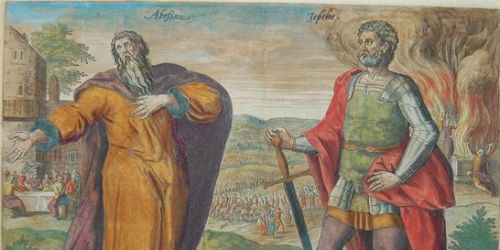
Ib’zan (אבצן , ‘ibhcān, to Shine, hence Illustrious;) was the tenth judge of Israel, one of the minor judges, following Jephthah. His account is recorded in Judges Judges 12:8-10.
He came from Bethlehem, probably the Bethlehem in Zebulun ( Joshua 19:15 ), 7 miles northwest of Nazareth. He had 30 sons and 30 daughters an evidence of his social importance and arranged their marriages. He judged Israel 7 years, and was buried at Bethlehem. According to Jewish tradition, Ibzan was the same as Boaz. [1]
He ruled but seven years, but by the number of his children, and his disposing of them all in marriage himself, it appears that he lived long; and probably the great increase of his family, and the numerous alliances he made, added to his personal merits, made him the more fit to be either chosen by the people as Jephthah was, or called of God immediately, as Gideon was, to be Israel’s judge, to keep up and carry on the work of God among them. That which is remarkable concerning him is,
1. That he had many children, sixty in all, a quiver full of these arrows. Thus was Bethlehem of old famous for increase, the very city where he was to be born whose spiritual seed should be as the stars of heaven.
2. That he had an equal number of each sex, thirty sons and thirty daughters, a thing which does not often happen in the same family, yet, in the great family of mankind, he that at first made two, male and female, by his wise providence preserves a succession of both in some sort of equality as far as is requisite to the keeping up of the generations of men upon earth.
3. That he took care to marry them all. His daughters he sent abroad, he provided husbands for them; and, as it were in exchange, and both ways, strengthening his interest, he took in thirty daughters from abroad for his sons. The Jews say, Every father owes three things to his son: to teach him to read the law, give him a trade, and get him a wife. What a difference was there between Ibzan’s family and that of his immediate predecessor Jephthah! Ibzan has sixty children and all married, Jephthah but one, a daughter, that dies or lives unmarried. Some are increased, others are diminished: both are the Lord’s doing.
References:
Ibzan from Hastings’ Dictionary of the Bible
Matthew Henry’s Complete Commentary